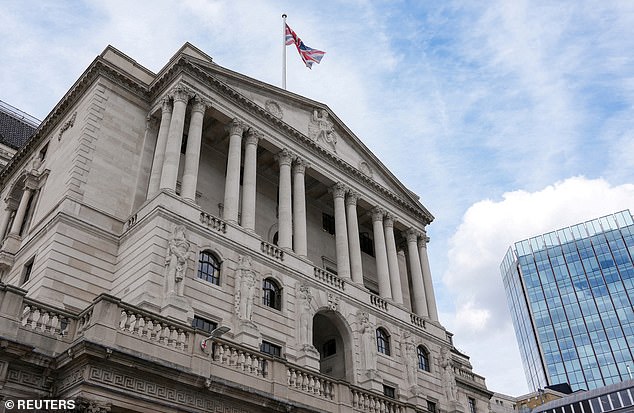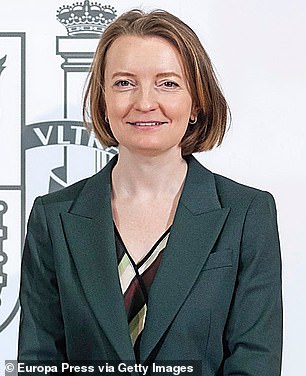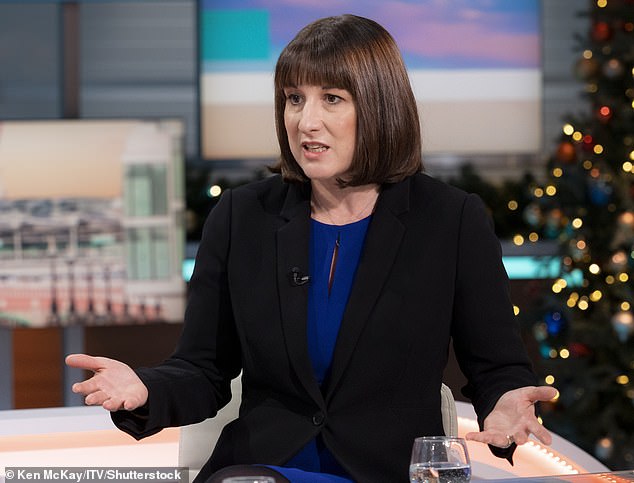Table of Contents
There are few British chancellors who have had as much insight into the thinking of the Bank of England as Rachel Reeves.
As a junior official at the Bank of England, who later helped set interest rates at leading mortgage provider HBOS, Reeves (pictured) enjoyed a privileged view of the process.
Reeves’ job at the Bank was to help produce the international context for the Inflation Report used by the nine-member Monetary Policy Committee (MPC) that sets interest rates.
Most of the thinking about interest rates is focused on achieving the headline inflation rate of two percent, as the Bank likes to say, “at all times.”
Experience: Chancellor Rachel Reeves served as a junior official at the Bank of England, before moving to help set interest rates at leading mortgage provider HBOS.
In making that judgment, both global and budgetary factors are important components.
Much of the attention of the Chancellor’s summer “audit” of Britain’s public finances is focused on the political aspect. A government that sees planning reforms as the key to unlocking its growth mission is cancelling major infrastructure projects (such as the much-debated road tunnel under Stonehenge) to meet fiscal targets.
This suggests a certain degree of seriousness in controlling indebtedness and debt, which is reassuring for financial markets.
Indeed, both the pound (which has held firm since the July 4 election) and falling government bond yields suggest that the Monetary Policy Committee may be more confident in cutting the bank rate from the current 5.25% than before. There should be no fear of a bond market eruption.
Quite the opposite. When inflation was well above target, as a result of supply chain problems caused by COVID-19 and Russia’s brutal war against Ukraine, it was critical that fiscal policy and interest rate policy move in the same direction.
The Conservatives’ battle against the unions was aimed at maintaining public sector wage levels to avoid a wage-price spiral.
Now that inflation is close to target, that battle has essentially been won, even as the Bank has been cautious about the labor market and average wage increases.
As Governor Andrew Bailey has argued on several occasions, inflation in the UK and Europe can largely be attributed to supply chain bottlenecks and energy costs.
There has been no wage-price spiral like in the 1970s and Reeves is ensuring that public sector wage arrangements, set by independent review bodies, are adequately funded.

Fears: Now that inflation is close to target, that battle has essentially been won, although the Bank has been cautious about the labor market and increases in average wages.
This provides an opportunity for the Bank of England. Every meeting of the Monetary Policy Committee begins with a fiscal briefing by the Treasury “watcher”.
The assurance this time that there will be no games played with public finances opens up the opportunity to start cutting British interest rates.
Market conditions have improved the odds of a rate cut as a firmer pound reduces the cost of commodities, particularly oil, most of which are priced in dollars.
International events, as was bitterly seen after the invasion of Ukraine, can also have a dramatic impact on domestic conditions.
High interest rates, over a long period, were a response to the oil price shock.
That has already happened and a sensible and classic economic response to geopolitical uncertainty, such as the current threat of all-out conflict between Israel and Hezbollah on the Lebanon/Syria front, might be to cut rates to shore up confidence.
Bailey has a golden opportunity to take the lead this week and cut rates by a quarter of a point. The bank has been on the lookout in the election campaign.

Key player: New MPC member Clare Lombardelli is a former Treasury and OECD economist
Other central banks, including the UK’s neighbours the European Central Bank, the Swiss Central Bank and G7 member Canada, have all opted to cut rates.
They have moved ahead of the United States, where strong domestic demand has constrained the US central bank, the Federal Reserve.
Bailey is just one vote on the Monetary Policy Committee, but interest rate setters, especially when several of them are insiders, should be persuaded to follow the governor’s lead.
By most accounts, the Monetary Policy Committee’s (MPC) decision this time is well balanced. Chief economist Huw Pill has warned that the main drivers of inflation in the UK, which are showing “uncomfortable strength”, could be the main obstacle.
At least one member of the group, Dave Ramsden, has joined the minority seeking lower rates.
Clare Lombardelli, the new member of the Monetary Policy Committee (MPC), a former Treasury and OECD economist, is an unknown. What we do know from the OECD’s forecasts is that she has been cautious about UK growth.
You may think that, with consumer prices under control, it is time to back Labour’s growth mission. Lowering interest rates and boosting house building is a key part of that mission.
The interest rate cut could provide a double boost for the Chancellor.
Not only could it help growth, which was firmly restored when he took office, but it will also save the Treasury money.
Commercial banks will receive a lower interest rate on demand deposits, which will reduce the Treasury’s exposure. In addition, lower rates will dramatically reduce the cost of servicing the national debt.
It is time for the Bank to abandon caution, acknowledge that inflation has been defeated, and support higher output and prosperity.
DIY INVESTMENT PLATFORMS

AJ Bell

AJ Bell
Easy investment and ready-to-use portfolios

Hargreaves Lansdown

Hargreaves Lansdown
Free investment ideas and fund trading

interactive investor

interactive investor
Flat rate investing from £4.99 per month

Saxo

Saxo
Get £200 back in trading commissions

Trade 212

Trade 212
Free treatment and no commissions per account
Affiliate links: If you purchase a product This is Money may earn a commission. These offers are chosen by our editorial team as we believe they are worth highlighting. This does not affect our editorial independence.
Some links in this article may be affiliate links. If you click on them we may earn a small commission. This helps us fund This Is Money and keep it free to use. We do not write articles to promote products. We do not allow any commercial relationships to affect our editorial independence.

